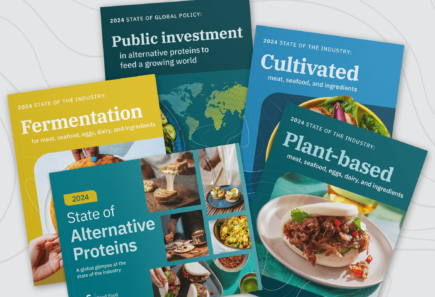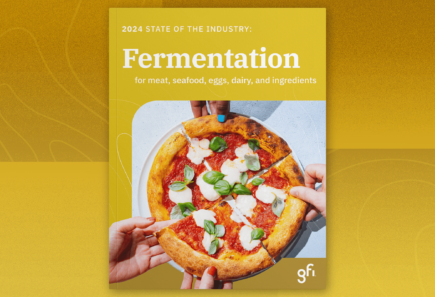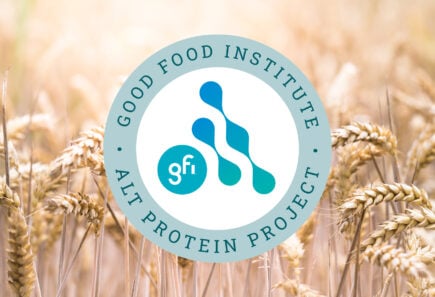
Deep dive: Fermentation metabolism and feedstocks
Explore how microbial metabolism converts feedstock to protein.

Explore how microbial metabolism converts feedstock to protein.

Dive into a category overview and insights for plant-based and fermentation-enabled steaks, filets, chicken breasts, and other whole-cut products.

Explore tactics to increase consumers’ purchase intent for plant-based products at retail, optimal category descriptors for plant-based food, and more.

Explore how to effectively engage chefs and foodservice operators to get alternative proteins on menus.

Understand alternative protein consumer segments, demographics, adoption, motivations, and perceptions.

Explore our comprehensive State of Alternative Proteins series for insights into the rapidly evolving alternative protein landscape.

Explore the processes, equipment, and bioreactors critical for commercial fermentation-derived ingredient production.

This report details the commercial landscape, investments, regulatory developments, and scientific progress in the fermentation for alternative proteins industry.

What does meaningful protein diversification look like in practice? Join GFI for a webinar covering insights from the World Benchmarking Alliance on their latest benchmarking results, Nestlé on their corporate strategy and leadership in this space, and GFI on our latest market research on the biggest opportunities for alternative proteins.

Join GFI's next Business of Alt Protein webinar covering insights from NECTAR's new Taste of the Industry 2025 report, featuring blind sensory analysis of 122 plant-based meat products across 14 categories.

Research shows that a large majority of American adults understand what plant-based meat products are based on current labeling.

Explore key consumer segments who are open to plant-based meat, including their demographics, attitudes, needs, and behaviors.

Join GFI's corporate engagement team for a webinar on April 8 providing an overview of GFI's new plant-based meat consumer segmentation that provides a framework to understand opportunities to grow plant-based meat consumption.

Alternative proteins play an essential role in meeting global climate goals. Learn more about what you can do to help change how meat is made.

This is your guide to plant-based meat. Explore our tools, resources, and expert analysis of this field, from science to policy and markets.

Learn how tension, compression, and shear tests—combined with constitutive neural networks—can be used to identify the mechanical signature of plant-based meats.

Students play a pivotal role in building the alternative protein ecosystem. Explore how you can start a student group at your university to accelerate the global transition to the future of food.

Explore key insights into consumer needs, perceptions, and demand for alternative proteins, highlighting trends and shifting preferences in the U.S. market.

Alternative proteins can address global health challenges while also offering diverse, healthy food options for consumers. Discover how alternative proteins can create a healthier future for all.

This fact sheet examines the relationship between plant-based meat prices and sales volume and identifies potential pricing and promotional strategies for the market.

Learn best practices for marketing and promoting plant-based meat, egg, and dairy items on foodservice and restaurant menus.

Join Dr. Michael Greger for a data-driven exploration of the health effects of plant-based meats compared to their animal-based counterparts.

Find information on nutrition, functionality, price, sourcing, and consumer perceptions of plant protein sources for plant-based meat.

Explore market data, menu ideas, and marketing strategies for launching plant-based items in restaurant and non-commercial foodservice channels.

Our technical analyses and reports identify solutions for alternative protein taste, price, scale parity, and improved environmental sustainability.

An analysis of the current U.S. market, consumer research, and key challenges, opportunities, and open questions for blended meat.

This life cycle assessment by GFI and EarthShift Global compares the environmental impacts of animal-based meat to plant-based meat made with different methods and ingredients.

Join us for a webinar on December 3rd to explore the most comprehensive, open-access LCA of plant-based meat to date.

Shifting toward alternative proteins addresses the twin crises of climate change and biodiversity loss by slashing agricultural emissions, reversing deforestation, and enabling restoration of critical ecosystems.

Explore our fact sheet to learn how alternative proteins support farmers, expand opportunities for agricultural livelihoods, and help create a healthy, resilient agriculture sector.
Join Priera Panescu, GFI's Lead Scientist, Plant-Based at SupplySide West October 28-31, 2024.

Discover our report summarizing 2023 survey results on omega-3 ingredient use and future plant-based meat and seafood production needs.

Discover key insights on U.S. households buying plant-based meat. Explore data on demographics, purchase habits, motivations, barriers, and more.

Alternative protein technologies produce meat with high efficiency, providing fortification for our food system and defense against growing threats.

Take a look at how alternative protein solutions are advancing around the world.


This factsheet summarizes recent research about U.S. consumer health perceptions of plant-based meat.

Join GFI for a webinar that dives into insights and strategies for plant-based companies to win in the foodservice sector.
We’re excited about the state of global policy. Here are the top three reasons why.

Plant molecular farming enables the production of animal proteins in plants. Learn more about this innovative technique in our latest fact sheet.